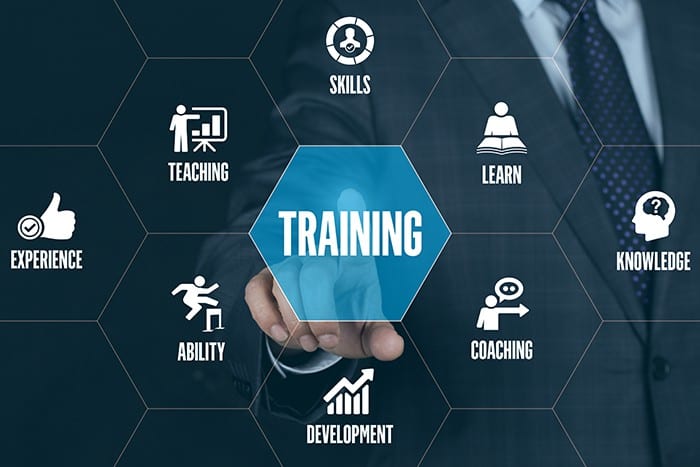What are the must-have corporate training programs for every industry? Check out the 15 prime examples that all industries should consider in their strategic training plan in recent years.
If you are wondering which examples of corporate training fit your company needs, this article is designed to answer your questions. And you also have deeper insight into Corporate training, and tips for holding successful Corporate training, from small-scale to large-scale numbers of participants.

Table of Contents
- What is Corporate Training and Why Use it?
- 20 Corporate Training Examples
- Create Your Own Training Programs
- Bottom Line
What is Corporate Training and Why?
Corporate training is a term that refers to the process of educating employees in order to improve their skills and knowledge in a particular area. This type of training is usually provided by organizations to their employees, with the aim of enhancing their overall performance and productivity. Corporate training programs are designed to meet the needs of the organization.
The benefits of corporate training are manifold. It helps employees to acquire new skills and knowledge, which they can use to perform their job duties more effectively. Corporate training also helps to improve employee morale, as it demonstrates that the organization is invested in their development and growth. Moreover, corporate training programs can help to reduce turnover rates, as employees who receive training are more likely to feel valued and engaged with their work. Corporate training can be used to address a variety of organizational needs.

15+ Corporate Training Examples for Each Industry
Are you looking for different types of corporate training? Effective corporate training programs are tailored to the needs of the organization and its employees. They should be designed to address specific skills gaps and should be delivered in a format that is most conducive to learning.
#1. Onboarding Training
This type of training is provided to new employees to help them become familiar with the company culture, policies, procedures, and their specific job roles. It typically includes orientation sessions and introductions to colleagues and management.
#2.Compliance and Regulatory Training
Organizations often need to ensure that their employees comply with legal and regulatory requirements. Compliance training covers areas such as workplace safety, data privacy, anti-discrimination, and industry-specific regulations.
#3. Leadership Development Training
Leadership development training, usually for Senior Executives, aims to build a strong foundation of leadership skills and competencies that can be applied in different contexts and situations, in order to create high-performing teams and achieve organizational success.
Through Leadership training, the company expects to promote new management teams with a strong understanding of a range of leadership styles and how to adapt to different situations and people, to motivate and inspire team members to achieve organizational goals, along with developing strategic planning and execution skills.
#4. Sales Training
Sales training is a program designed to improve the skills and knowledge of individuals in sales roles, with the goal of improving their ability to sell products or services effectively.
Participating in Sales training, employees can build up product knowledge and the ability to articulate value propositions, as well as enhance negotiation and closing skills, and how to handle buyer objections, not to mention an opportunity to practice how to use sales tools and technology effectively, such as CRM systems and sales automation software.
#5. Customer Service Training
Customer service training is a process of educating employees on how to provide exceptional service to customers. This kind of functional skill training typically involves teaching communication skills, problem-solving techniques, conflict-resolution strategies, and product knowledge.
The goal of customer service training is to equip employees with the tools they need to meet and exceed customer expectations, build positive relationships with customers, and ultimately improve customer satisfaction and loyalty.
#6. Data Analysis and Reporting Training
Data analysis and reporting training is a type of technical training that focuses on developing employees' skills in analyzing and interpreting data to make informed business decisions.
The training typically covers topics such as data collection, data cleansing, statistical analysis, data visualization, and report writing. The goal of this training is to provide employees with the ability to extract valuable insights from data and communicate those insights effectively to stakeholders through clear and concise reporting.
#7. Cybersecurity Awareness Training
With the dramatic change in technological advancement, it is important to offer Cybersecurity awareness training that covers topics such as basic cybersecurity concepts, common threats and vulnerabilities, password best practices, social engineering attacks, phishing awareness, and secure browsing habits.
By improving their cybersecurity awareness, employees can help protect their organization's sensitive data and systems, reduce the risk of data breaches and cyber-attacks, and ensure the overall security of the organization.
#8. Human Resource Training
If the company wants to focus on human development, it can consider doing human resource training, which covers recruitment and selection, performance management, employee relations, compensation and benefits, and compliance with labour laws and regulations.
Employees will be equipped with multiple approaches, deep insight and skills needed to effectively manage the human resources aspects of their job responsibilities, whether they are in a dedicated HR role or not.
#9. Project Management Training
In order to prepare for short-term and long-term projects, companies can consider equipping their employees with Project management training to ensure success in completing projects within scope, time, and budget constraints.
The training involves improving employees' knowledge and management skills in project planning, scheduling, budgeting, risk management, time management, communication, team leadership, and decision-making.
#10. Conflict Resolution Training
Conflict resolution training is a type of soft skills training that focuses on developing employees' skills in resolving conflicts in the workplace. This training typically covers topics such as identifying the sources of conflict, active listening, effective communication, negotiation, and mediation.
This training is designed to provide employees with the certain understanding and skills needed to handle conflicts in a constructive way, reduce tension and stress, and maintain positive relationships with coworkers.
#11. Health and Safety Training
This training typically consists of courses related to workplace hazards and risks, safety regulations and compliance, emergency preparedness and response, injury prevention, and health and wellness promotion.
The goal of this training is to provide employees with the knowledge and skills needed to identify and mitigate potential hazards in the workplace, prevent accidents and injuries, and promote overall health and well-being.
#12. Workplace Ethics
The compliance training aims to provide employees with the knowledge and skills needed to maintain ethical standards in their work and to create a culture of integrity and accountability in the workplace, with a decrease in toxic working environments.
It involves professional conduct, confidentiality, conflicts of interest, workplace discrimination and harassment, and compliance with laws and regulations.
#13. Employee Wellness and Health Programs
Some organizations offer training related to employee health and well-being, including stress management, nutrition, fitness, and mental health awareness.
#14. Cross-Functional Training
Cross-functional training allows employees to gain knowledge and skills beyond their primary roles, which can enhance collaboration and innovation within the organization.
#15. Team Building and Employee Engagement
These programs aim to strengthen team dynamics, boost morale, and improve overall employee engagement. Activities may include team-building exercises, workshops, and retreats.
Create Your Own Training Programs
Training can be conducted in a variety of formats, there are 4 types of training business including classroom sessions, online modules, role-playing exercises, and on-the-job coaching. And, the HR department also decides whether they should prioritize functional skills or technical skills first, and make sure there is a balance between these exercise/activity types such as endurance, strength, balance, and flexibility.
Questions have been raised about whether the trainee might be reluctant to or perceive the training programs as not interesting, beneficial or useful. Thinking of that, you might want to find better ways to keep learners motivated, engaged and joyful. Here are some tips to deliver amazing training programs.
- Incorporating with a training centre to offer professional trainer certification.
- Doing surveys and employee performance/evaluation to understand their needs, strengths and areas for improvement to offer more suitable training.
- Utilizing innovative presentation tools to deliver engaging and interactive content. AhaSlides can be a good start for companies looking for new ways of presenting ideas and involving games and quizzes in the training, both free and paid.
- Use flexible online learning modules if there are remote teams, or for those who prefer a work-life balance.
- Combining team-building activities with formal training.

Bottom Line
To sum up, corporate training is a vital component of any business strategy. It ensures that employees have the necessary skills and knowledge to perform their jobs effectively, and it helps to improve the overall performance of the organization. With the right training programs in place, organizations can achieve their goals and stay ahead of the competition.








